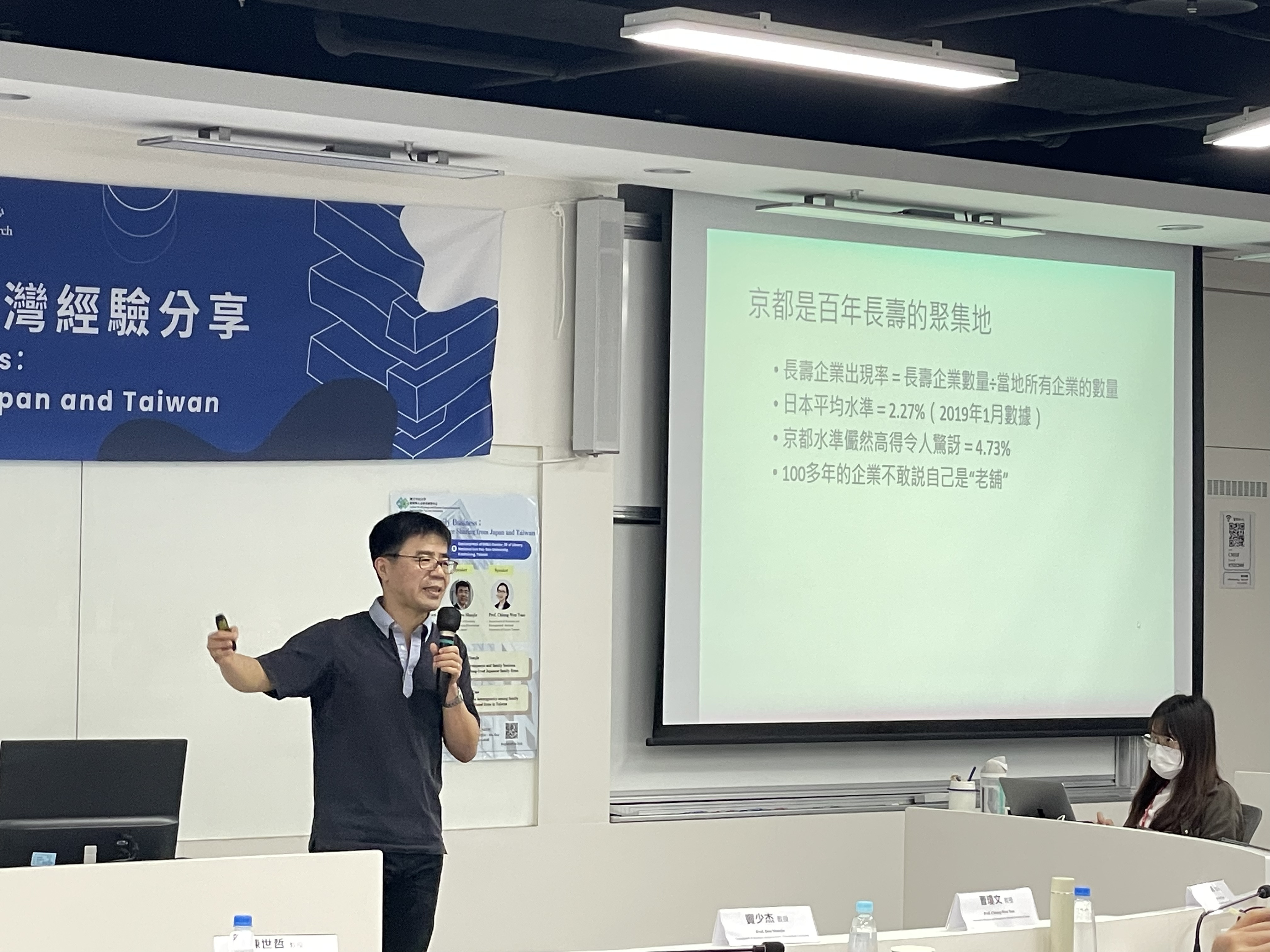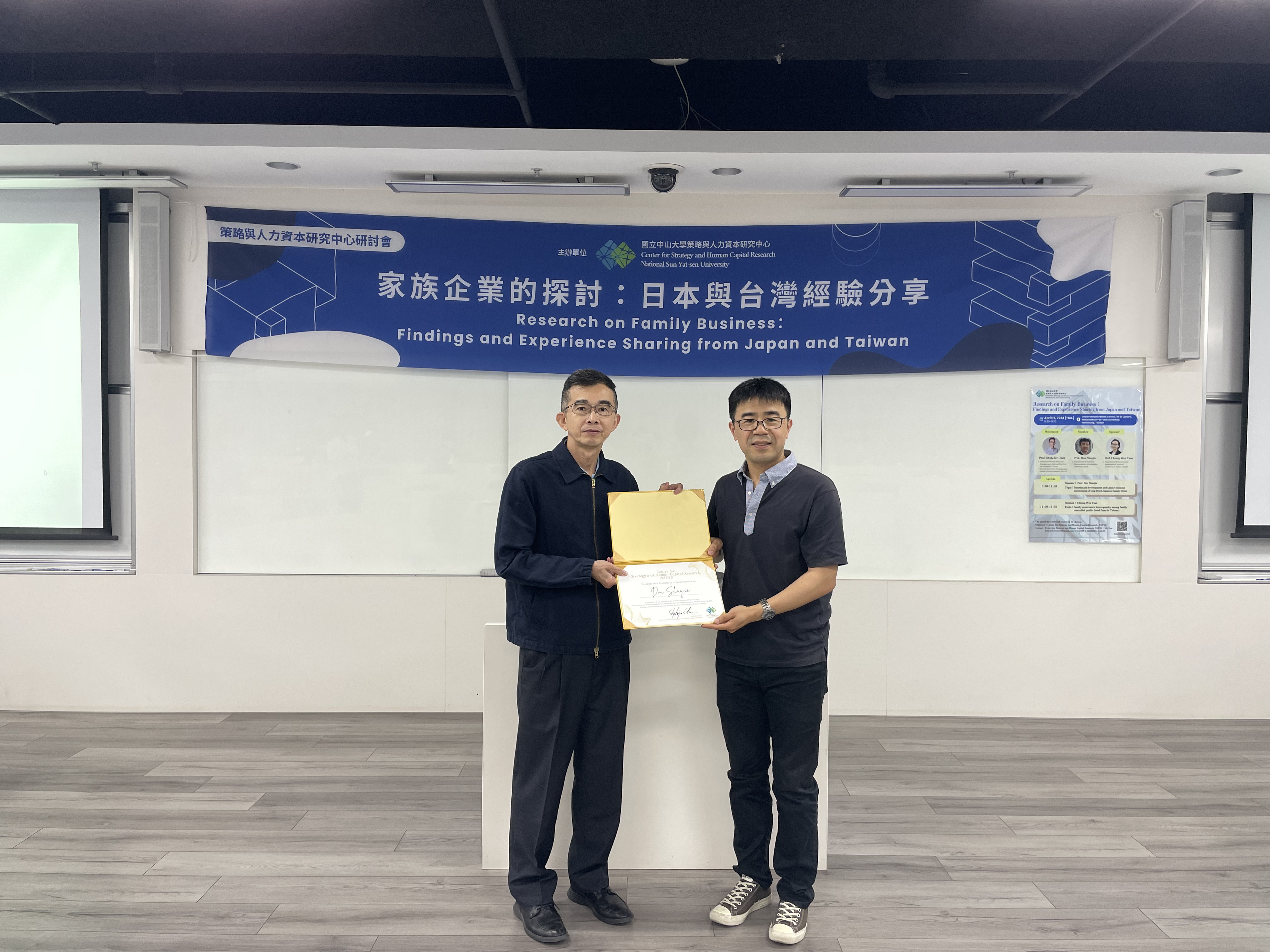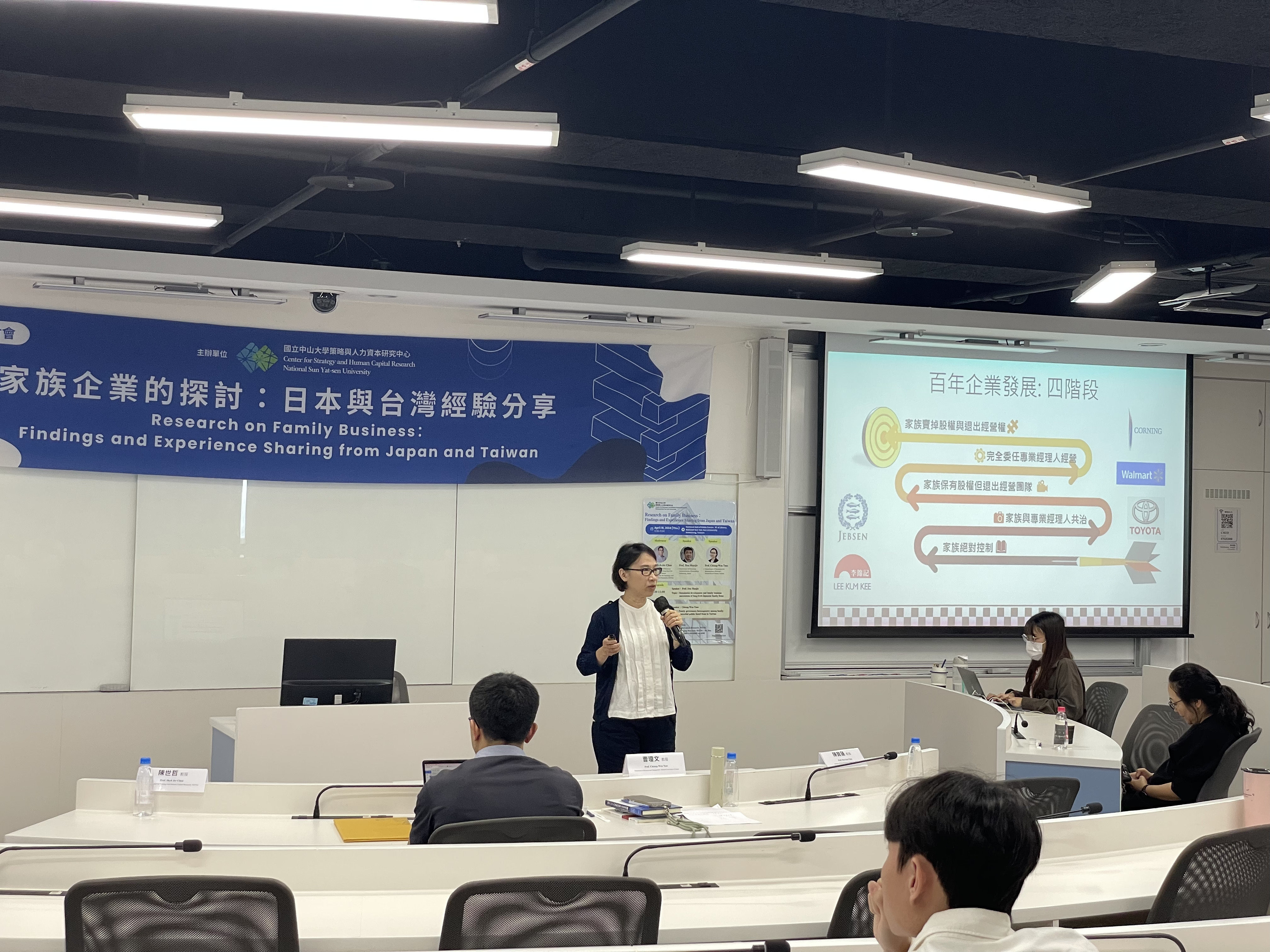Research on Family Business: Findings and experience Sharing from Japan and Taiwan (2024/04/18)
2024/04/18
Research on Family Business: Findings and experience Sharing from Japan and Taiwan
The Center for Strategy and Human Capital Research at National Sun Yat-sen University (NSYSU) organized a seminar titled "Research on Family Business: Findings and experience Sharing from Japan and Taiwan", and invited Prof. Dou Shaojie from Department of Business Administration, Ritsumeikan University, Japan, and Prof. Chiung-Wen Tsao from the Department of Business Administration at National Tainan University, to talk about family business in Japan and Taiwan. The seminar was moderated by Prof. Shyh-Jer Chen, Director of the Center for Strategy and Human Capital Research at National Sun Yat-sen University, who expressed great honor in hosting two professional speakers specializing in the study of Japanese and Taiwanese family businesses. The aim was to provide deeper insights into the differences between Japanese and Taiwanese family businesses through their valuable insights and comparisons.

Insights from the Management Experiences of Japanese Family Businesses
Prof. Dou Shaojie currently teaches at the Department of Business Administration at Ritsumeikan University in Japan. He mainly researches on the operation and management of Chinese and Japanese enterprises, including human resource management, labor relations, and performance management. This time, Prof. Dou shared the successful experience of Japanese longevity enterprises with the topic of "Sustainable development and family business successions of long-lived Japanese family firms". First of all, he mentioned that Japan is a big country of long-lived firms, with a population of about 120 million, which is currently ranked 11th in the world, but the number of century-old enterprises far exceeds that of other countries. According to the TEIKOKU DATABANK and the Bank of Korea, in addition to having over 40,000 centennial companies, Japan ranks first in the world in terms of the number of long-lived firms, with more than 3,000 of them have existed for more than 200 years. Kyoto has the highest density of centennial companies in Japan, with a longevity company occurrence rate of 4.73%, twice the Japanese average. Therefore, companies in Kyoto are reluctant to call themselves century-old companies because this area is full of companies with a long history. Prof. Dou also used his own experience in Japan to explain that long-established companies are actually among people's daily lives. In fact, the well-known companies such as Shiseido, Nintendo, Suntory, and Ichizawa Shinzaburo are all centuries-old companies.
Three Fimensions of "Sustainable Development of Family Businesses"
Prof. Dou then introduced the three dimensions of "sustainable development of family businesses", namely family management, business management and wealth management. Firstly, family management is the most important among them. Prof. Dou pointed out that the role and relationship of the family in the business need to be effectively managed in order to avoid family disputes. Secondly, for business operation, the family business must have excellent business management skills to maintain the stable operation of the business. Lastly, for wealth management, family businesses must properly manage and utilize their accumulated wealth to achieve a sustainable foundation. Prof. Dou also used the above three dimensions to analyze the three companies as case examples, Tsukaki Group, Shoyeido, and Fukujuen.
The reasons of long-lived companies lie in Japanese society include continuing to be regarded as a virtue and focusing on the persistence of craftsman culture. The culture of adopted children does not put so much emphasis on blood relationships instead, they allow the adopted children to become the successors of the business. Hence, the company will have an independent and self-disciplined financial situation and will use a long-term perspective to formulate development strategies. In terms of business operation, these long-lived firms stress) on sticking to their own business, believe that all innovations are based on the core competitiveness of the enterprise, and attach importance to the inheritance and implementation of business philosophy and family tradition. In addition, long-life firms usually do not expand blindly, but pursue an appropriate scale. One of the corporate management principles of Shoyeido is "not to enter the Chinese market", which means that they give up a larger market for the sake of quality control. In terms of family management, these companies have considered the issue of family business succession from an early stage, emphasizing the inheritance of family culture, and paying special attention to communication between two generations, believing that family succession is the shared responsibility for both generations, and providing strict succession education from an early age. Women also play an important role in long-lived family firms, mainly in maintaining family relationships, including taking care of the physical and psychological conditions of family members and employees, and allowing family members to return to their roots at critical moments. As for the wealth management, these companies focus on risk management and implement steady business strategies. For example, Tsukaki Group does not put all its eggs in the same basket, but divides its wealth into three equal parts, namely spends on estate, main industry, and investment respectively. They also implement a 100% family inheritance system for successors. Since Japan’s inheritance tax is as high as 55%, Japanese long-lives firms usually deal with inheritance tax issues in a planned way to ensure that the company’s wealth can be passed down stably.
Perspectives from Research on Taiwanese Family Businesses
The topic of Prof. Chiung-Wen Tsao’s speech was "Family governance heterogeneity among family controlled public listed firms in Taiwan ". Prof. Tsao first elaborated the definition of family enterprises and emphasized that if they meet one of the standards of family shareholding, family management control, and governance monitoring, they can be classified as a family business. According to statistics, a large portion of the enterprises in the free market are defined as family-owned enterprises, including Formosa Plastics Group, Ford, Lee Kum Kee, and LEGO. Family governance control heterogeneity arises from the pluralistic combination of ownership, governance and operational management, which may lead to different perspectives of interests within the family business, e.g., differences in the perspectives of shareholder family members and employees, which may cause conflicts and challenges in corporate governance and stakeholder management.
As the size of the organization increases, the proportion of equity and operating rights of family firms gradually decreases. This trend is also known as de-familiarization. Prof. Tsao further explored the existence of de-familiarization in Taiwan. She pointed out that although the rate of group managers being appointed by internal members has not changed significantly, the rate of chairman concurrently serving as general manager has increased, indicating an increase in family control, which means that Taiwan's listed OTC companies does not de-familiarized. Instead, the scale of familiarization is getting higher and higher. Finally, Prof. Tsao analyzes the effect of family governance heterogeneity on financial performance and finds that family firms often perform less well than firms governed by professional managers, and that firms that are de-familiarized or have higher managerial ratios are beneficial to the overall stock market profitability. The reasons for this situation are inconsistency of goals and conflict of interests, including the early dispute over the Formosa Plastics Group's family assets and the Evergreen Group's brotherly conflict, which show that if the family relationships are not properly handled, it can have a negative impact on the operation of a business.
The insightful sharing by the two speakers that day provided the audience with valuable takeaways, and understand the key strategies in family management, enterprise management as well as wealth management through actual enterprise cases.





